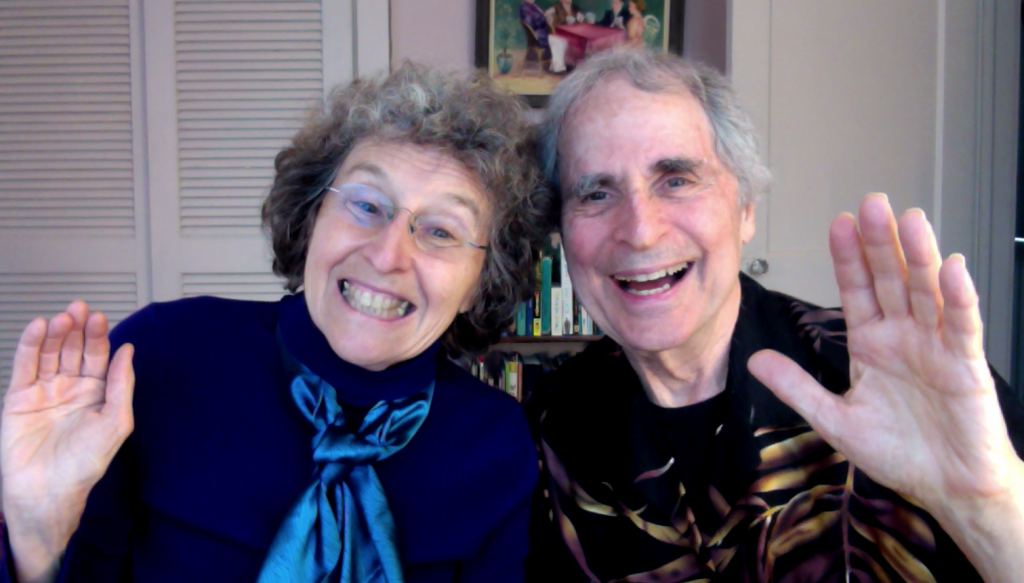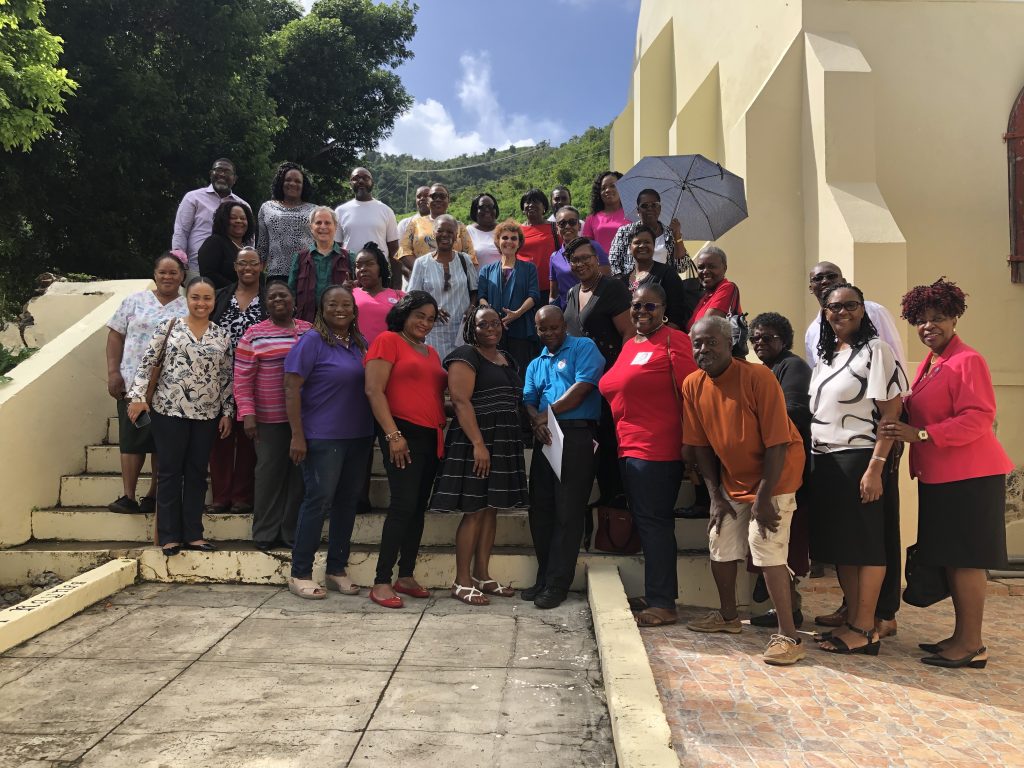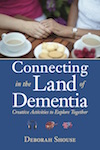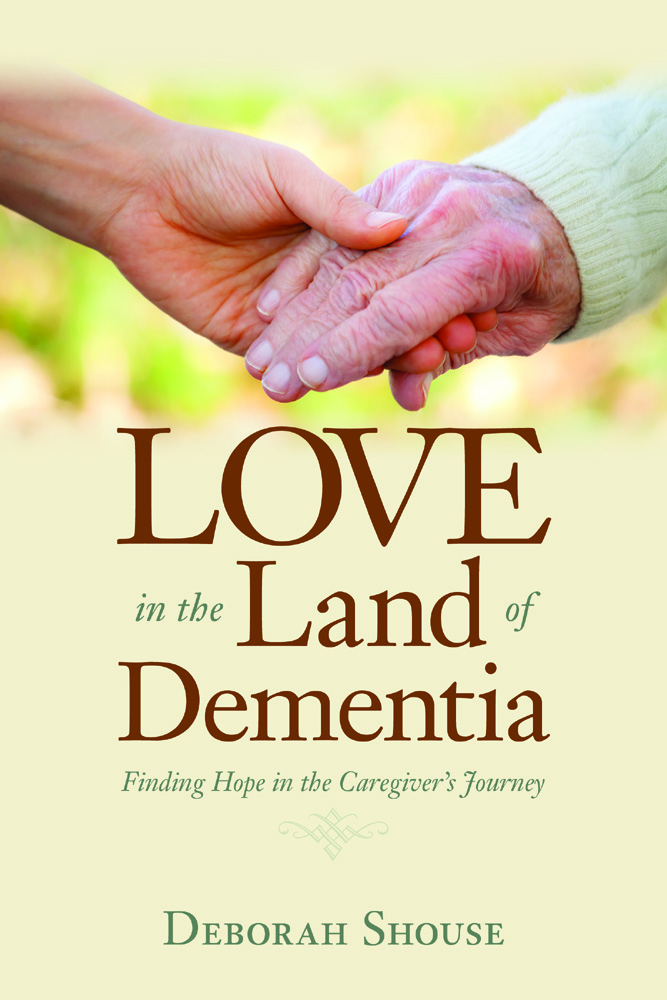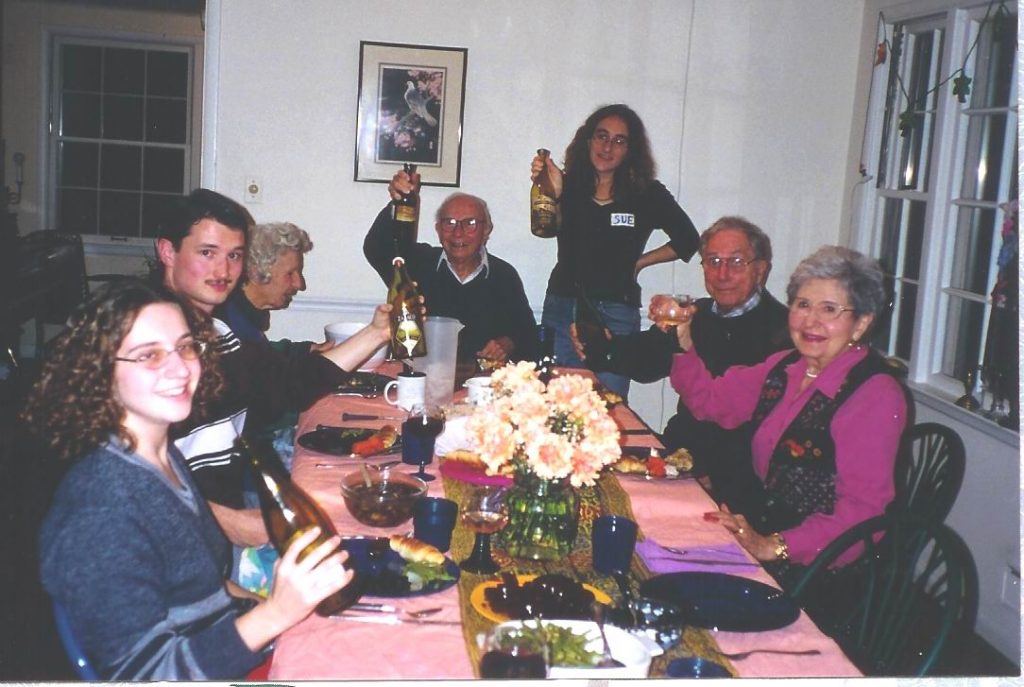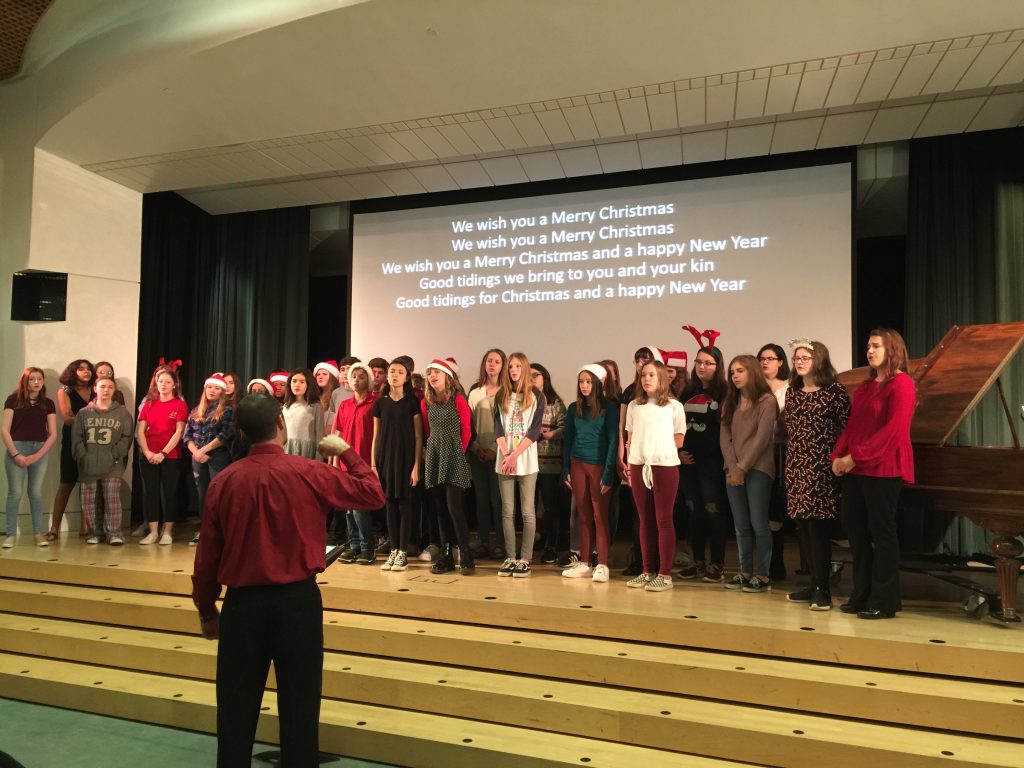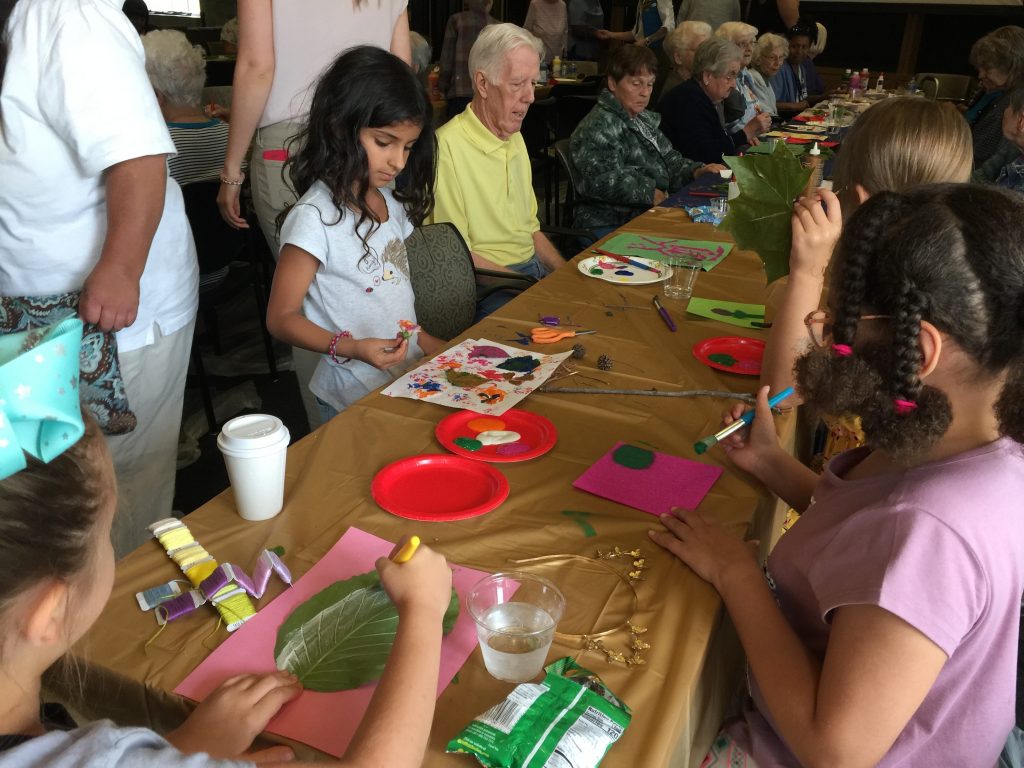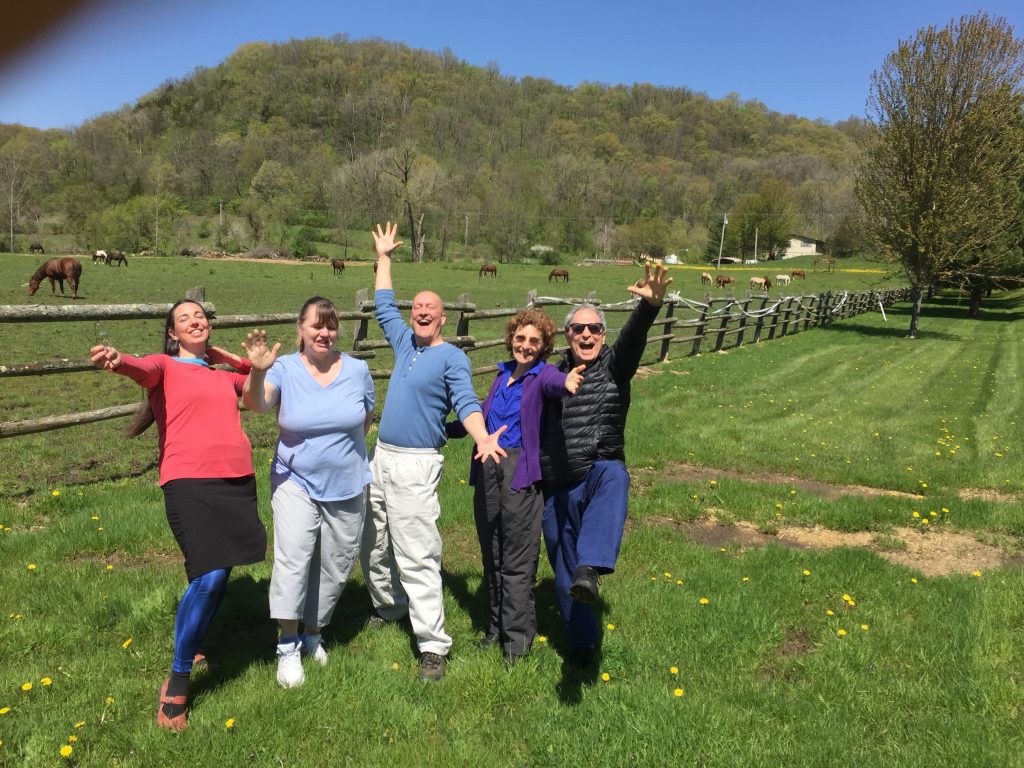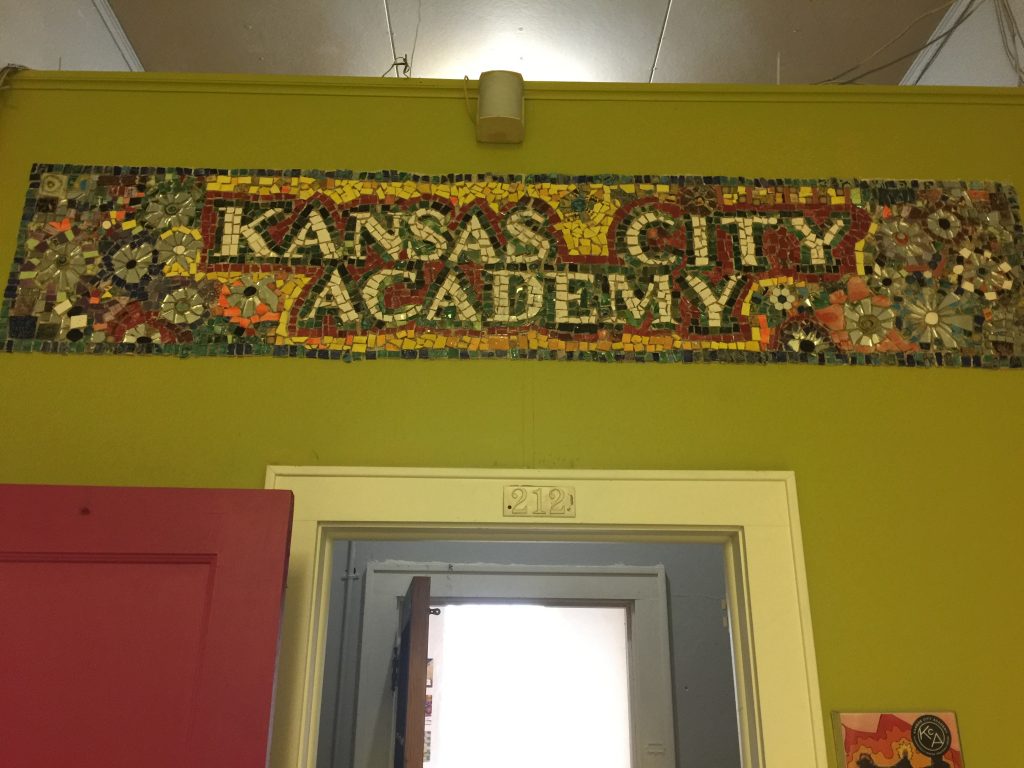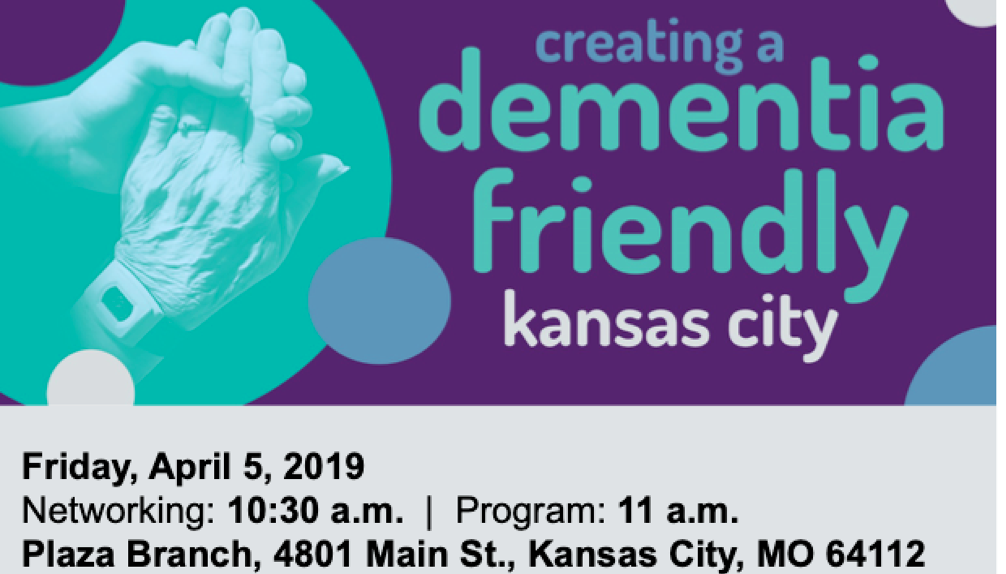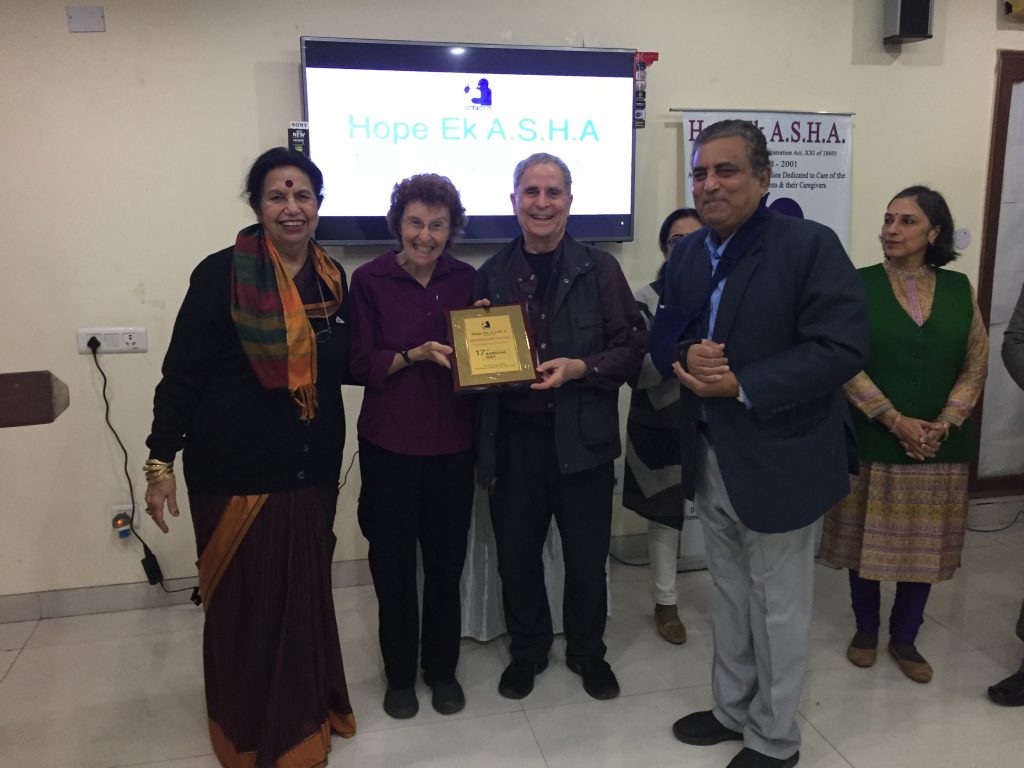Communication
Come Laugh with Us: A Free Virtual Dementia-Friendly Experience
Laughter is an instant vacation. Milton Berle
Let’s have a staycation and laugh together. Please join us April 6, Tuesday afternoon at 1:00 Central Time, 2:00 Eastern, for our next laughter session.
You’ll boost your immune system, lift your spirits, and get a nice little workout. Plus, you’ll meet a great group of people and have fun! Please laugh with us every other Tuesday afternoon at 1:00 Central Time, 2:00 Eastern time.
We designed our free 30-40 minute interactive sessions for people who are living with dementia. All are welcome, including care partners, family members, and friends. It’s great fun and a good energy and mood booster.
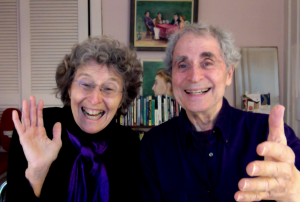
Presenting to Care Partners in Tortola: The Power of One Person to Make a Difference
The founding of the Virgin Islands Alzheimer’s Association in Tortola, BVI, is about the power of one person to make a difference. It started at a Rotary Club meeting in 2013 when a fellow Rotarian confided in Edna Williams, “I have been diagnosed with Alzheimer’s.”
He told her how hard it was to find support and resources. Edna felt compassion for her friend and others in his situation. As a trained social services worker, human resources consultant, and woman of action, she went to work to remedy the situation. The results: a vibrant Association recognized by Alzheimer’s Disease International. The Association and its many volunteers serve as advocates for people who are living with dementia and their friends and families.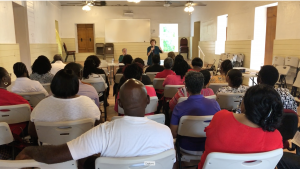
We were honored to spend time with Edna and to share our presentation with a group of family and professional care partners, social workers, and community and spiritual leaders. As we talked about the strength of music to keep us connected, Dawn, the daughter of Edna’s Rotarian colleague, the man who had inspired the founding of the Association, stepped forward to tell us her own story.
For several years, her father had been listless and withdrawn, seldom showing interest in anything. She mourned his father’s dynamic personality and tried many things to lift his spirits and pique his interest. Then she came upon a favorite song of his from years back, a lively tune with a Latin beat.
“When I played that song for him,” she told us, “he came to life. His eyes brightened and he began to mouth, then sing the words. He leaned forward in his chair, wanting to get up and move. It was such a meaningful transformation. The music connected with him and that helped him connect with us.”
Her touching story was a reminder that arts and creativity can go beyond the rational mind and the spoken word and awaken our hearts and spirits.
As we shared ideas for staying connected with each other, regardless of our abilities, our own hearts and spirits were expanded by our time with Edna and her group. It’s wonderful to live in a place of breathtaking beauty. It’s even greater to live in a community where people reach out to help and support their neighbors.
Seven Secrets of Dementia Inclusive Holiday Cooking
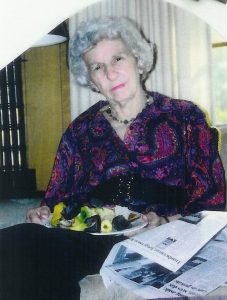 “Who prepared this delicious meal?” a friend asked during a holiday dinner.
“Who prepared this delicious meal?” a friend asked during a holiday dinner.I named my brother Dan, our head chef, first. Then I included the support team—myself, my mom, my daughters and nephews.
“Did I help?” Mom whispered as I passed her the mashed potatoes.
“You sure did,” I told her. ”You mashed the potatoes, put the marshmallows on the sweet potato casserole, and mixed the fruit salad.”
“That’s good,” she said. “I like to help.”
Our desire to help and contribute to seasonal celebrations doesn’t end with a diagnosis of dementia. It’s lovely to linger in the kitchen together, preparing food for the holidays. It’s even lovelier when you can adapt and enjoy dementia inclusive holiday cooking so that people of varying abilities can participate.
Rebecca Katz, author of The Healthy Mind Cookbook, sees food as a great equalizer, something anyone can enjoy regardless of abilities. Fixing a delicacy for someone offers a tangible and delicious way to give back.
Here are six secrets of dementia Inclusive holiday cooking.
- Leaf through a favorite family cookbook or recipe box and use the pictures and recipes as a catalyst for conversation. Ask open-ended questions, such as, ”What does that brownie recipe make you think of?” “What do you like about the holiday season?”
- Chose a time of day when you’re both rested.
- Create a comfortable kitchen environment, by playing familiar seasonal songs you can both hum or sing along to.
- Reduce extraneous noise and distractions, such as a television in the background.
- If you wish, take photos during the experience. That way, you can relive the adventure and share with family and friends.
- Indulge in instant gratification, if possible, by sampling your work when the cooking is complete.
- Even if the person living with dementia can’t help prepare food, he can still enjoy sitting in on the action and the conversation.
Whether you’re stirring a pot of orzo or dropping mint leaves into cool water, enjoy your time of creation and connection in the kitchen.
A longer version of this piece originally appeared on Joan Lunden’s excellent website: Enjoy Dementia Inclusive Holiday Cooking. Thanks to Sue Fitzsimmons, MS, ARNP, Judith Fertig, author of The Memory of Lemon, Kate Pierce, LMSW, Alzheimer’s Association Greater Michigan Chapter, and Rebecca Katz, author of The Healthy Mind Cookbook
Deborah Shouse is the author of Connecting in the Land of Dementia: Creative Activities to Explore Together and Love in the Land of Dementia: Finding Hope in the Caregiver’s Journey.
KC Movies & Memories’ New Focus on Musicals: Oh What a Beautiful White Christmas
First we get people’s toes tapping and hands clapping with live musical performances from some of Kansas City’s great musicians. Then KC Movies & Memories’ new focus on beloved movie musicals keeps our audience engaged and connected. This is a lively, intergenerational experience that families can easily replicate. Please see our invitation below.
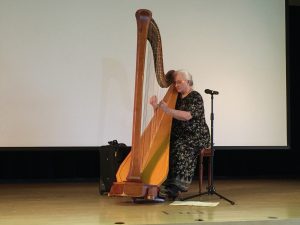 Our November program delighted guests with an eclectic array of harp music, performed by Juli Sackman. We followed that with the story of the award-winning movie Oklahoma, punctuated by lively song and dance numbers. Here is the link to that experience.
Our November program delighted guests with an eclectic array of harp music, performed by Juli Sackman. We followed that with the story of the award-winning movie Oklahoma, punctuated by lively song and dance numbers. Here is the link to that experience.
https://www.youtube.com/watch?v=56FbaPmCIbQ&feature=youtu.be
In December, we were wowed by Indian Hills Middle School eighth grade choir. They entertained us with intricate renditions of holiday tunes. Then, Jim Poplau, manager of the Waldo Library, shared one of his favorite holiday films, White Christmas. Watching the 1954 trailer of the film, in Vista-Vision, reminded many of the rare childhood treat of attending the cinema. Jim regaled us with the complicated plot of the film and shared some of the beloved songs, including Sisters, Count Your Blessings and of course White Christmas, which we all sang along with.
Here’s a link to that experience:
https://www.youtube.com/watch?v=jN2p3vw3jyI&t=13s
Invitation: If you’d like to add some musical movie offerings to your holiday gathering, simply email us at creativity@pobox.com and we’ll send you a PDF 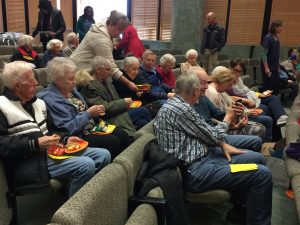 featuring YouTube song clips and scripts you can modify for your family. These Movies-in-a Minute are courtesy of the Kansas City Public Library and The Creativity Connection.
featuring YouTube song clips and scripts you can modify for your family. These Movies-in-a Minute are courtesy of the Kansas City Public Library and The Creativity Connection.
Here’s to a lovely and meaningful holiday season.
What we look for in our dementia-friendly films.
- Uplifting content
- A straightforward narrative that’s easy to follow.
- A subject matter that people might identify with
- No violence and a minimum of startling or loud noises
- No subtitles or complicated foreign accents
- Familiar or soothing music
Please join us for our Holiday Memory Cafe…
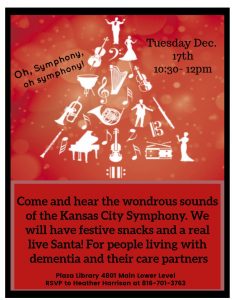
Deborah Shouse is the author of Connecting in the Land of Dementia: Creative Activities to Explore Together and Love in the Land of Dementia: Finding Hope in the Caregiver’s Journey.
Using Nature to Connect with Creativity and Generations: KC Memory Cafe
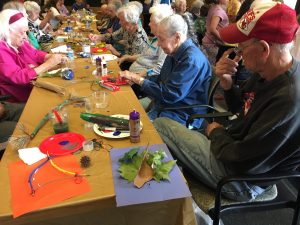 The tables are scattered with pine cones, sycamore leaves, and decorative branches, along with bottles of glue, vivid construction paper, and pots of colorful paint. Our KC Memory Cafe begins with sharing memories of camping, scouting, or outdoor activities. Then a lively group of Girl Scouts leads us in song, reminding us to, “Make new friends, But keep the old, One is silver, And the other gold.”
The tables are scattered with pine cones, sycamore leaves, and decorative branches, along with bottles of glue, vivid construction paper, and pots of colorful paint. Our KC Memory Cafe begins with sharing memories of camping, scouting, or outdoor activities. Then a lively group of Girl Scouts leads us in song, reminding us to, “Make new friends, But keep the old, One is silver, And the other gold.”
After our singalong, cafe guests experiment with the art supplies and natural 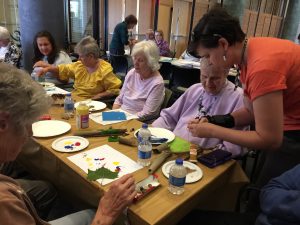 objects. They dip pine cones into red paint and brush blue across crusty leaves. They paint a stick bright orange and wrap it with yarn. The Girl Scouts weave through the artists, pouring extra paint, distributing additional papers, and assisting when asked. The guests work, admire, chat, and laugh as these creative projects emerge. By the end of the cafe, the tables are covered with innovative art and people are smiling as they return home.
objects. They dip pine cones into red paint and brush blue across crusty leaves. They paint a stick bright orange and wrap it with yarn. The Girl Scouts weave through the artists, pouring extra paint, distributing additional papers, and assisting when asked. The guests work, admire, chat, and laugh as these creative projects emerge. By the end of the cafe, the tables are covered with innovative art and people are smiling as they return home.
Click here for a look at our cafe.
Want to introduce more nature into your lives?
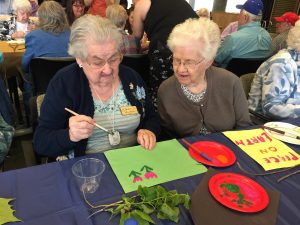 “Research shows that nature-based activity is therapeutic and is essentially a form of treatment for dementia symptoms, helping a person remain at home longer,” says Garuth Chalfont PhD, American Society of Landscape Architects, and author of the. Dementia Green Care Handbook.
“Research shows that nature-based activity is therapeutic and is essentially a form of treatment for dementia symptoms, helping a person remain at home longer,” says Garuth Chalfont PhD, American Society of Landscape Architects, and author of the. Dementia Green Care Handbook.
Gathering flowers, walking a tree-lined sidewalk, plucking a cherry tomato off its vine, watering a house plant, gazing out the window at chickadees—these meaningful natural activities increase pleasure, relaxation, social interactions, and sensory stimulation.
Here are a few other ideas:
• Create observation spots in your living space so you can enjoy looking outdoors. Even watching the weather helps people feel engaged in the natural environment.
• Improve your view with interesting additions, such as bird feeders and birdhouses, bubbling fountains, wind chimes, wind spinners, outdoor sculpture, and various plants and herbs.
• Add resilient plants to your home. 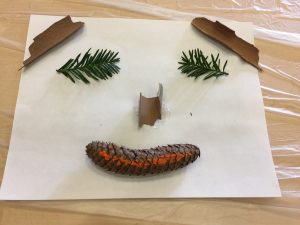
• Bring in natural objects to touch, identify, arrange, draw and craft with.
• Visit garden centers, parks, playgrounds, and zoos for a rich natural experience.
• Increase your popularity by taking a dog with you on a walk, either your own or borrow your neighbor’s pup.
Click to view informative and inspiring short videos on our YouTube channel
Deborah Shouse is the author of Connecting in the Land of Dementia: Creative Activities to Explore Together and Love in the Land of Dementia: Finding Hope in the Caregiver’s Journey.
Laughing All the Way: Boosting Health and Happiness
“When You Laugh, you change,
and when you change the whole world changes.”
-Dr Madan Kataria, MD, Founder Laughter Yoga Movement
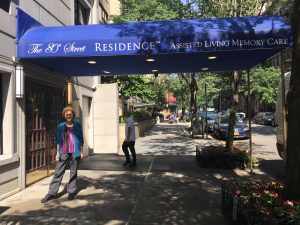 We were warmly welcomed into a parlor area, reminiscent of an elegantly aging aunt’s apartment. A piano waited patiently along one wall. There was a colorful bowl of fruit and a tempting array of pastries and fruit-infused waters. As we waited, we looked out into an outdoor garden and picnic area. The 80th Street Residency, a memory care community in Manhattan, created a warm, home-like atmosphere for its residents. Ron and I had come here to offer a laughter yoga class, hoping to boost our participants’ health and happiness. We worked with their activities coordinator, Jackie LaBau.
We were warmly welcomed into a parlor area, reminiscent of an elegantly aging aunt’s apartment. A piano waited patiently along one wall. There was a colorful bowl of fruit and a tempting array of pastries and fruit-infused waters. As we waited, we looked out into an outdoor garden and picnic area. The 80th Street Residency, a memory care community in Manhattan, created a warm, home-like atmosphere for its residents. Ron and I had come here to offer a laughter yoga class, hoping to boost our participants’ health and happiness. We worked with their activities coordinator, Jackie LaBau.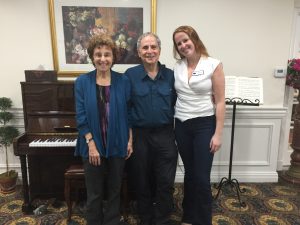
Here’s what we’ve learned about laughter yoga: often people look, act, and feel differently after they’ve experienced a session. There is a magic about intentionally laughing with a group. The experience of breathing, clapping, engaging in playful imaginings, and of course, laughing, soon softens the spirits. People feel energetic and connected. Everyone, including staff, residents, and us, leave feeling happier. That’s what happened in New York, just as it has every time Ron and I have led laughing sessions.
Back home in Kansas City, we laughed with the lively people at Jeanne’s Place, CareHaven’s day program for people living with early stage dementia. We have laughed with these wonderful folks before, and now they start giggling when we walk in.
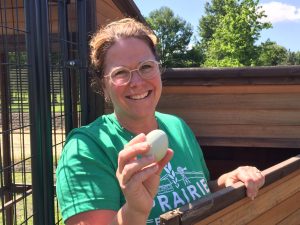 We also visited Mandy Shoemaker and her team at Prairie Eider Care, our area’s only Eden Alternative homes, and we had fun admiring their outdoor barnyard collection of silky chickens, a potbellied pig, and sassy ducks. Then we settled into their welcoming living areas. We sat in intergenerational circles with staff, family members, and residents, talking, singing, and laughing.
We also visited Mandy Shoemaker and her team at Prairie Eider Care, our area’s only Eden Alternative homes, and we had fun admiring their outdoor barnyard collection of silky chickens, a potbellied pig, and sassy ducks. Then we settled into their welcoming living areas. We sat in intergenerational circles with staff, family members, and residents, talking, singing, and laughing.
Dr. Kataria, the founder of Laughter Yoga, believes that inviting out our childlike energy and acting playfully is vital to living a balanced and healthy life. Plus, it’s tremendous fun. He says: “Laughter Yoga is an aerobic workout that helps uplift your mood within minutes by releasing endorphins from your brain cells. You often remain energized, relaxed, and in good spirits throughout the day. Laughter also makes our immune system stronger, increases oxygen intake, and reduces stress. Plus laughing with others builds a social bond and reduces feelings of isolation.”
In our groups, we created laughter milkshakes, with each person choosing their favorite flavor of ice cream. We looked at each other, waved, and laughed. We had a lot of dog lovers in our groups, so we imagined how a chihuahua would laugh. A member of the nursing team loved large dogs and she helped us to guffaw like a Great Dane. Most of our group loved baseball, so we sang, “Take Me Out to the Ballgame,” then substituted the words with “Ha Ha “ syllables, otherwise known as the Ha Ha Chorus. That chorus works for any familiar song and tickles your funny bone.
Ron and I learned Laughter Yoga from the amazing Robert Rivest, who is a master 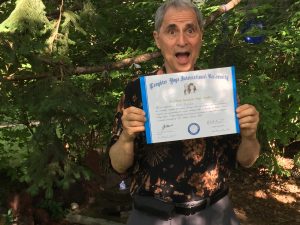 trainer and who studied with Dr. Kataria. But you don’t need to be a trained facilitator to bring more laughter into your life.
trainer and who studied with Dr. Kataria. But you don’t need to be a trained facilitator to bring more laughter into your life.
Quick Tips for Adding Laughter into the Day
•Look at the clock and laugh for one minute.
•When driving, laugh during red lights.
•When working out, pick a couple of exercises, such as squats and curls, and laugh while you’re doing them. (Want to get others laughing? Do this at the gym!)
•Use the “ha ha chorus” to bring giggles into your life. Take any song and substitute “ha ha ha’s” for the words. This works well in the shower, car, on walks and more.
Want to laugh more?
Visit laughteryoga.org and robertrivest.com
Contact Deborah Shouse and Ron Zoglin: 816-361-7878 Email myinfo@pobox.com Website: DemeniaJourney.org
If you are part of a memory care community in the KC area and you’d like to gift your residents with laughter, feel free to reach out to us at creativity@pobox.com
Click to view informative and inspiring short videos on our YouTube channel
Deborah Shouse is the author of Connecting in the Land of Dementia: Creative Activities to Explore Together and Love in the Land of Dementia: Finding Hope in the Caregiver’s Journey.
Talking about Dementia with Teens
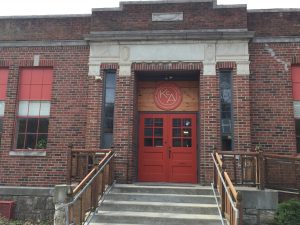 We were delighted to spend time with the bright and curious sixth and seventh graders in Mary Silwance’s class at KC Academy. They had read the young adult novel Hour of the Bees, which features a poignant relationship between a pre-teen girl and her grandfather who is living with dementia, and they wanted to learn more. During our short time together, talking about dementia with teens, we discussed:
We were delighted to spend time with the bright and curious sixth and seventh graders in Mary Silwance’s class at KC Academy. They had read the young adult novel Hour of the Bees, which features a poignant relationship between a pre-teen girl and her grandfather who is living with dementia, and they wanted to learn more. During our short time together, talking about dementia with teens, we discussed:
- How it might feel for people who are living with dementia
- Stigma and stereotypes
- Creativity and dementia
- Becoming an advocate
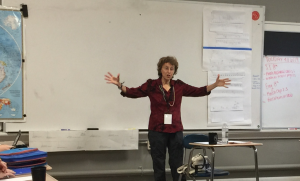 Here are a few excerpts from our lively conversation:
Here are a few excerpts from our lively conversation:
How many of you have ever misplaced something? How did you feel when you couldn’t find it?
How many of you have ever forgotten what you were going to say?
Have any of you ever overslept, woken up in a panic, and not known what day it was?
Those kinds of issues happen to most of us, at least occasionally.
But imagine how you would feel if they started happening all the time. You kept misplacing your cell phone, your homework, your library books. You couldn’t remember your address or your teacher’s name. What if you raised your hand to answer a question at school and the words you were going to say just disappeared. Or they came out all jumbled up? What if it happened so often that you started to worry about talking and became more and more quiet?
These are a few of the things that people who are living with dementia have to cope with.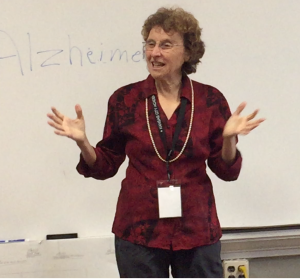
With most illnesses, people cluster around and want to help you. But some people with memory loss actually lose their friends. We know dementia is not contagious, so why would people shy away?
People are scared when their friends and family members start changing. They’re worried they won’t know what to say or how to communicate. They’re worried about making a mistake. But the only mistake is abandoning a person you care about.
Lots of people are working together to make life better for those who are living with dementia. And some are those are people who are living with dementia. They say, “Nothing about us without us,” which means, “Don’t make plans about our lives without consulting us.”
How you can be an advocate
- Watch your language. Don’t use the words victim or sufferer with Alzheimer’s or dementia. These are strong and courageous people dealing with a brain disease.
- Look for opportunities to spend time with people who are living with dementia.
- Don’t worry if you don’t know what to say. Look at the person. If they’re in a wheelchair or chair, bend or kneel so you can have eye contact.
- Try to find a quiet place to talk and listen. Some people are overwhelmed by too much noise.
- Remember to slow down because some people need extra time to answer questions.
- Seek ways to connect through arts and imagination, including music, drawing, cooking, gardening, and flower arranging.
Click here to experience part of the conversation
Click to view informative and inspiring short videos on our YouTube channel
Deborah Shouse is the author of Connecting in the Land of Dementia: Creative Activities to Explore Together and Love in the Land of Dementia: Finding Hope in the Caregiver’s Journey.
Creating a Dementia Friendly Kansas City
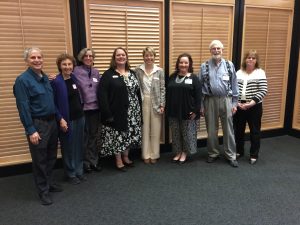 Luck. Kismet. The stars aligning. Those are all valid descriptions of our April 5th event, Creating a Dementia Kansas City.
Luck. Kismet. The stars aligning. Those are all valid descriptions of our April 5th event, Creating a Dementia Kansas City.
First, we were lucky to have two great speakers: Emily Kearns, PhD, formerly of Dementia Friendly Massachusetts and Michelle Niedens, from the University of Kansas Alzheimer’s Disease Center.
Then, a lovely splash of kismet when Emily and April Roy, Director of the Plaza Library, were invited to join Gina Kaufmann on KCUR’s Central Standard.
Thanks to Central Standard and lots of grass roots marketing, almost 100 people attended 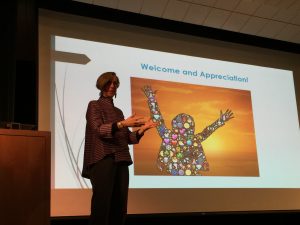 from many different sectors. Our attendees included representatives from The Alzheimer’s Association, The Nelson-Atkins Museum of Art, The Kansas City Symphony, The Renaissance Festival, KC Actors Theatre, The Naka-Kon Anime Convention, the Mayor’s office of Culture and Creative Services, as well as the medical and healthcare communities, senior services providers, the library community, first responders, faith communities, social work consortiums, people who are living with dementia and their friends and care partners, community volunteers, and more.
from many different sectors. Our attendees included representatives from The Alzheimer’s Association, The Nelson-Atkins Museum of Art, The Kansas City Symphony, The Renaissance Festival, KC Actors Theatre, The Naka-Kon Anime Convention, the Mayor’s office of Culture and Creative Services, as well as the medical and healthcare communities, senior services providers, the library community, first responders, faith communities, social work consortiums, people who are living with dementia and their friends and care partners, community volunteers, and more. 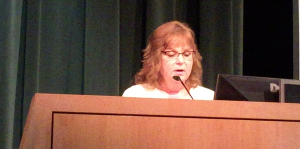
Our vision was beautifully articulated by our two speakers: “We envision Kansas City as a community where every citizen feels welcomed, valued, and engaged.”
We’ve only just begun and we welcome your support.
Click on this link to enjoy a brief sampling of our Dementia Friendly Kansas City official launch
Click here to preview some inspiring action steps
Click to view informative and inspiring short videos on our YouTube channel
Please consider joining us for our follow through Lunch and Learns.
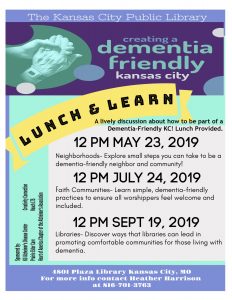
Deborah Shouse is the author of Connecting in the Land of Dementia: Creative Activities to Explore Together and Love in the Land of Dementia: Finding Hope in the Caregiver’s Journey.
Free events for people living with dementia and their care partners
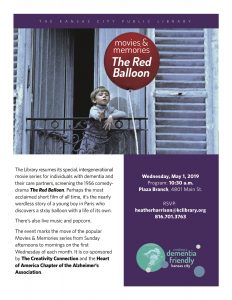
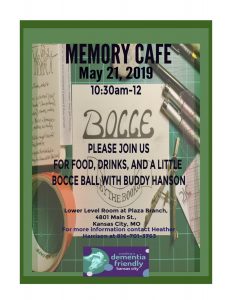

Coming Together to Ignite Hope: Working with Dr. Chawla in New Delhi, India
Our Uber driver in New Delhi was a turbaned Sikh with a long gray beard. A sign hanging from the rear view mirror proclaimed, “This car respects women.” He deftly drove us through the city, navigating the melee wherein four lanes of cars compete in a two-lane space. Inside the NGO, Hope Ek A.S.H.A., the receptionist led us into Dr. Chawla’s office. Dr. Chawla has a rich voice and a magnetic presence. She is the catalyst for this center for caregivers, creating the service because of her own experience with her mother and Alzheimer’s. We were coming together to ignite hope.
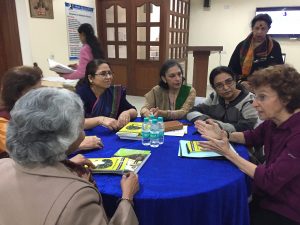
“We know how hard it is for the caregivers,” she says. She and her team help caregivers throughout New Delhi and indeed, throughout the world, educating them, visiting with them and their loved ones who are living with dementia, facilitating support groups, sharing stories and ideas, offering respite and financial support as possible.
For this event, she has gathered a group of doctors, caregivers, support staff, and more. First, some of her team show us activities they do with clients who are living with dementia. These include chanting, deep breathing, gentle stretching, tapping (EFT- Emotional Freedom Techniques), and a lovely heart opening exercise that affirms “We are healthy, we are happy.” They show us painting and games that strengthen memory.
Join us for these interesting exercises:
Then a caregiver from Mumbai Skypes in. Her voice is sad and her face is drawn and pale. She wipes at her eyes as she discusses her issues with her father. Instantly, one of our caregivers steps forward to offer advice. I share ideas with her as well. Then Dr. Sahi, leader of the New Delhi Laughter Academy, guides us in laughter exercises. Within minutes, we are all laughing, even our friend from Mumbai. When the session ends, the worn and weary caregiver has been transformed into an energetic and renewed woman, one who believes there is hope.
That’s is one of the reasons we all came together: our mutual hope and our belief that everyone needs support and a sense of community and purpose.
Experience our New Delhi caregiver’s event by watching this video:
Deborah Shouse is the author of Connecting in the Land of Dementia: Creative Activities to Explore Together and Love in the Land of Dementia: Finding Hope in the Caregiver’s Journey.
